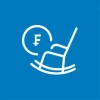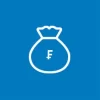Savings accounts are one of the most popular banking services in Switzerland. This moneyland.ch guide offers useful tips for optimal use of savings accounts.
Tip 1: Compare interest rates
The interest rates of savings accounts vary broadly. Each bank chooses the interest rates of its savings accounts by itself. The savings account comparison on moneyland.ch shows you how much interest you will get from each savings account.
Young people and students benefit from higher interest rates at some banks. In the past, some banks charged negative interest for savings account balances that exceeded certain thresholds. Age-based bonus interest rates and possible negative interest rates are both accounted for in the moneyland.ch savings account comparison.
Tip 2: Check the limits on interest yields
Some banks use different interest rates for different portions of your savings account balance. One interest rate applies to the portion of your money below a certain threshold, and a different rate applies to the portion above that threshold. Generally, the rate that applies above the threshold is lower. These thresholds are accounted for in the moneyland.ch savings account comparison.
Example: A savings account has an interest rate of 1 percent per year, but a lower interest rate of 0.75 percent per year applies to the amount that is higher than 25,000 francs. So if you keep 50,000 francs in the savings account, you will earn 437.50 francs of interest per year.
Tip 3: Look at bonus savings accounts
Bonus savings accounts reward you with a higher interest rate than regular savings accounts from the same bank, when certain conditions are met.
A number of Swiss banks offer bonus savings accounts, but the terms and conditions vary broadly between accounts. Typical examples of bonus savings accounts include the following:
- Bonus interest for deposits: If you deposit at least a certain, predetermined amount every year, you receive extra interest. The special interest rate applies to your full savings account balance. This bonus interest rate typically applies long-term.
- Bonus interest for new money: If you transfer money from a different bank to your bonus savings account, you get a special bonus interest rate for the new money transferred to the bank. Pay attention to possible additional requirements. This kind of bonus interest rate often only applies for a limited period of time – typically around one year.
- Bonus interest tiers: Each year in which you deposit money into your savings account and do not make any withdrawals, you are moved up to a higher interest rate. The new interest rate applies to your entire account balance. After many years of depositing money and not making any withdrawals, you benefit from a high interest rate. Savings accounts with tiered interest rates are offered on an ongoing basis.
Important: Bonus savings accounts often have stricter limitations for withdrawals, such as longer notice periods for withdrawals that exceed a certain limit. You may also only get the higher interest rate if you do not make any withdrawals, or do not make more than a predefined maximum number of withdrawals from your savings account.
Tip 4: Pay attention to costs
Swiss savings accounts normally do not have basic account fees. You do not pay a monthly or an annual fee to have the account. Only a few Swiss banks charge basic account fees.
But some banks only let you open a savings account in combination with a banking package or a private account. Many banks charge fees for those products.
Banks also charge fees when you transfer money out of a savings account, or when you close your account and terminate your banking relationship.
Tip 5: Set up standing orders
It can be beneficial to set up a standing order to automatically transfer a certain amount of money from your private account to your savings account every month.
For example, you can set a savings goal for yourself. Or you can put aside money in a separate savings account every month towards the cost of taxes, healthcare expenses, or car-related expenses. When it comes time to pay these expenses, you can use the money you saved in your savings accounts.
Tip 6: Do not use your savings account to make payments
Savings accounts should not be used to make outgoing transfers such as bill payments. Banks normally charge a five-franc fee every time you transfer money from a savings account. Moving money your savings account to your private account at the same bank, on the other hand, is normally free of charge, if you remain within the limits for withdrawals.
If you have a joint account – a household account, family account, or flat mate account, for example – you should be careful not to transfer money directly from your savings account to the joint account. Many banks charge the five-franc fee for this kind of transfer as well. If you have your private account and savings account at the same bank, make sure to first move the money to your private account, and then transfer it from your private account to your joint account.
Tip 7: Check the minimum deposit requirements
There are Swiss savings accounts which you can only get if you deposit a certain amount of money into them, as defined by the bank. Some accounts require a minimum deposit of 5000 or even 10,000 francs.
Tip 8: Stay within the limits for withdrawals
Savings accounts normally have stricter limitations on withdrawals than private accounts do. These limitations are the price you pay to earn the higher interest.
If you withdraw more money than the terms and conditions allow for, you are charged a penalty fee. At most banks, the penalty fee for making a withdrawal without notice is 2 percent.
Each savings account offer has its own terms and conditions for withdrawals. Depending on the bank, withdrawal limits may apply per month, per quarter, or per year. A limit of 20,000 francs per year is common. But some savings accounts have limits as low as 5000 francs per year, while others have limits as high as 100,000 francs per year.
Some banks also limit the number of withdrawals you can make without paying the penalty fee. For example, a bank may allow a maximum of twelve withdrawals from your savings account per year. If you make additional withdrawals, you are charged a fee (3 francs per withdrawal, for example).
Tip 9: Divide your savings between different banks
It can be beneficial to divide your money between several different Swiss banks.
You can open a savings account at a different bank without having to give up your existing bank account, which avoids unnecessary hassles.
Swiss bank depositor protection only covers up to 100,000 francs per person and bank. This limit applies to all of your eligible accounts at one bank combined. By dividing your savings between savings accounts at multiple banks, you optimize the protection provided by the depositor protection scheme.
It can be practical to have your savings account at a different bank than your private account because your savings are segregated from the rest of your money. That can help you avoid the temptation to spend your savings. Like your emergency fund, your savings are tucked away where you cannot easily get to them.
Tip 10: Reclaim withholding taxes
The interest you earn from savings accounts is subject to a withholding tax (unless it is less than 200 francs per year or is not paid out annually). Make sure to declare your savings accounts on your Swiss tax returns to get the withholding tax refunded.
More on this topic:
Compare savings accounts now






